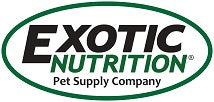.jpg)
Chinchillas are charming, high-energy pets that require a specific diet to stay healthy and thrive. In the wild, these small herbivores consume a high-fiber diet made up of grasses, shrubs, and other roughage. In captivity, it’s important to replicate that natural diet as closely as possible to support their digestive and dental health.

Whether you're a new chinchilla owner or looking to fine-tune your pet’s feeding routine, here’s what you need to know about feeding your chinchilla the right way.
The Foundation: High-Fiber Pellets and Hay
The core of any healthy chinchilla diet should be a grass-, hay-, and grain-based pellet such as our Chinchilla Diet with Rose Hips Chinchilla Food. These pellets provide a balanced combination of essential nutrients while promoting digestive health through fiber. Freshness and consistency are key—nutritional quality begins to decline as the pellets age, so always check expiration dates and store feed properly.
Timothy Hay should be offered in unlimited amounts alongside pellets. This fibrous hay is not only essential for digestion, but it also helps naturally grind down teeth, which is important since chinchillas' teeth grow continuously throughout their lives.
Limited Grains and Treats
While pellets and hay should make up the majority of the diet, small amounts of grains like oat groats, rolled oats, and wheat can be offered occasionally. These should always be given in moderation, as too much can disrupt digestion or contribute to unwanted weight gain.
Treats, if offered, should account for no more than 10% of the total diet. Suitable treats include dried herbs, dried flowers, sunflower stalk slices, raisins, or small pieces of dried root vegetables. However, nuts and seeds should be strictly avoided due to their high fat content, which chinchillas are not equipped to process.

Note: Treats should never be given to chinchillas that are under 6 months old, ill, or pregnant. Their digestive systems are more sensitive during these stages, and even natural treats can cause digestive upset.
Dental Health and Chewing Needs
Like all rodents, chinchillas have teeth that never stop growing. Without proper wear, these teeth can overgrow and lead to painful dental issues or eating difficulties. Providing safe chewing materials is essential to prevent these problems.
Chew items such as pumice stones, antler chews, or untreated wooden sticks should always be available in the enclosure. Additionally, feeding a high-fiber hay supports natural grinding of the teeth during chewing.
Water Matters
Fresh, clean water should be available to chinchillas at all times. Use a water bottle with a sipper tube to keep water clean and avoid contamination. Do not use distilled water, as it lacks essential minerals that support overall health. Instead, offer filtered or tap water (if safe in your area).
Feed Changes and Storage Tips
Chinchillas can have sensitive stomachs, so any changes in their diet should be made gradually over the course of 1–2 weeks. Start by mixing small amounts of the new food with the current food, slowly increasing the proportion of new feed each day.
Be mindful of shelf life when purchasing and storing chinchilla food. Many pellet-based feeds begin to lose vital nutrients shortly after milling, and most are only fully nutritious for about six months. Contrary to popular belief, freezing pellets does not significantly extend their shelf life and may impact texture and flavor.

When to Supplement
While a well-balanced diet generally provides all the nutrients a healthy chinchilla needs, supplementation may be recommended in certain situations. These include:
-
Illness or recovery from surgery
-
Pregnancy or nursing
-
Known calcium deficiencies
In such cases, a daily multivitamin supplement like the VitaGlow Supplement may help support the animal’s immune system and overall wellbeing. Always consult a veterinarian before starting supplements, especially if your chinchilla has health concerns.
Final Thoughts
Feeding your chinchilla correctly is one of the most important aspects of responsible care. By focusing on high-fiber pellets, unlimited hay, and safe, limited treats, you’ll be supporting both their digestive and dental health for the long term.
Remember, consistency, freshness, and moderation are key. With a proper diet and a little daily attention, your chinchilla can enjoy a long, healthy, and happy life.
__________________________________________________________________________________________________________
Ready to Shop? Shop By Pet or Shop By Category
Want Discounts? Click here to subscribe to email and SMS marketing
Got Questions? Browse more free Blogs or Contact Us with any inquiries regarding our products.
Notice: Exotic Nutrition cannot provide specific care guidelines on an individual basis. Please consult a veterinarian or experienced breeder.
Exotic Nutrition is proud to serve hundreds of universities, zoological parks, veterinarians, research centers and other institutions seeking to advance the health and well-being of exotics worldwide. See a full list of institutions using our products here.
Exotic Nutrition has a heart for animals in need. Through regular donations to rescues, rehabilitators, and special fundraiser events, Exotic Nutrition is making a significant impact in the lives of animals. See a full list of our charitable donations here.

Leave a Comment